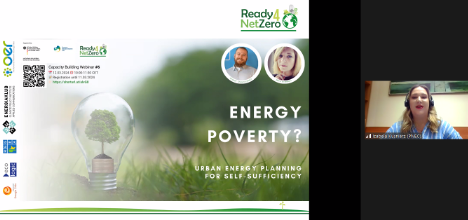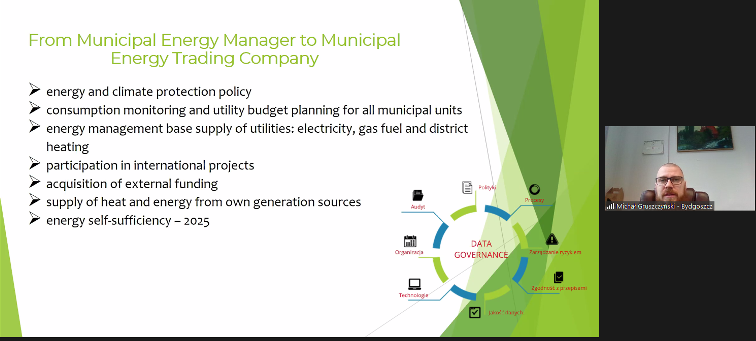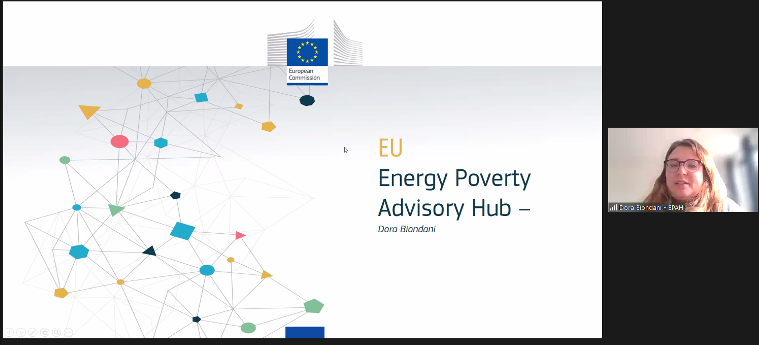Conclusions After the Last Ready4NetZero Web Seminar
The 6th and last online event of the EUKI project Ready4NetZero capacity development programme was organised on 12 March 2024. More than 45 participants engaged during this web seminar about urban energy planning and the challenge of energy poverty. This web seminar showcased the remarkable efforts of Bydgoszcz municipality in Poland made towards achieving energy self-sufficiency.

The web seminar was organized by PNEC- Association of Municipalities Polish Network “Energie Cités”, the coordinator of the Ready4NetZero project, and hosted by Izabela Kuśnierz. She gave a brief presentation of the Ready4NetZero project and a summary of the 5 web seminars organized so far, with indications of the recorded materials and presentations that can be downloaded from the project website.
The first speaker was Michał Gruszczyński, a lawyer specialized in administrative law and also an inspector in the Energy Management Team at the Bydgoszcz City Hall. He described in detail the city’s goals and ambitions, completed and planned activities and investments in the areas of energy efficiency and production. They started this journey in 2013 with only one position of Urban Energy Manager and in 2016 established an Energy Management Team of 8 members, setting a target for Bydgoszcz city to achieve energy self-sufficiency in 2025.

The first innovative solution that made a real difference for the Bydgoszcz administration was launching a unique 100% digital database, the “Energy Management Database”, based on an RPA (Robotic Process Automation) which automatically collects invoices, calls for payment, contractual penalties, interest notes and other data; extracting all needed figures from these documents and transmitting alerts and feedback. Another important measure was established following the introduction by the Polish state of a new tax in 2019 for the consumption of reactive energy. Conceding that Reactive power can account for up to 40% of the monthly electricity distribution invoice, Bydgoszcz Municipality invested in installing 30 active reactive energy compensator devices. In conclusion, Mr. Michał Gruszczyński emphasized that the new challenge now is finding solutions for energy storage, as building storage units remains a problem to be solved.
Dora Biondani, the second speaker, is a Project Manager at Energy Poverty Advisory Hub (EPAH) – Climate Alliance, the leading EU initiative run by the European Commission at the request of the European Parliament, to eradicate energy poverty and accelerate the just energy transition of European local governments. She explained that in the current context, “Energy poverty means a household’s lack of access to essential energy services that provide basic levels and decent standards of living and health, including adequate heating, hot water, cooling, lighting and energy to power appliances, in the relevant national context, existing social policy and other relevant policies, caused by a combination of factors, including but not limited to non-affordability, insufficient disposable income, high energy expenditure and poor energy efficiency of homes”, a broader definition encompassing the whole issue of home heating at European level. EPAH offers tailored support to 85 municipalities, out of which Zagreb – Croatia and Metz – France were given as an example.

It also offers an e-learning platform (elearning.energypoverty.eu) which can be used, 3 online courses and some very useful publications (like the Energy Poverty Guide – a practical guidebook aiming to give local governments and practitioners concrete procedures and a clear path on how to address energy poverty), that can be downloaded from the website. Mrs. Dora Biondani concluded her presentation by emphasizing that awareness on energy poverty is growing across Europe. She also mentioned a big upcoming event, “Empowering Local Governments: Bridging Policy and Practice in Tackling Energy Poverty”, a Policy Conference co-organized with the European Parliament on April 10, 2024, in Brussels.
The complete recording of the web seminar can be accessed here.
This web seminar was the last one from of a series of 6 other similar events, all part of the Ready4NetZero project. This capacity-building programme targets the municipal administration staff from the project pilot cities, but also other local authorities in Croatia, Hungary, Poland or Romania. Throughout the project, the team will organize in-person workshops to address country-specific needs, online train-the-trainer events, as well as a study visit to several forerunner cities in Germany, for a good practice transfer and experience sharing among local public administrations converging on developing and implementing local long-term climate strategies.
Ready4NetZero is a EUKI funded project coordinated by the Polish Network “ENERGIE CITÉS”, with a consortium formed of the Ecologic Institute from Germany, ENERGIAKLUB from Hungary, REGEA from Croatia and Energy Cities Romania. Ready4NetZero aims to support cities from the participating countries in developing and implementing 2050 climate neutrality strategies and seeks to do this by building capacity, knowledge and skills among local leaders, municipal staff and local stakeholders, facilitating experiences exchange and dialogue between local authorities.
This 6 web seminar series has ended and was part of the Ready4NetZero project. This capacity-building program targeted the municipal administration staff from the project pilot cities, but also other local authorities in Croatia, Hungary, Poland or Romania. Below you can find the presentations and the webinar recordings.
- Long-term vision: a possible way to self-sufficiency and climate neutrality in 2035
- Financing climate transition
- Navigating challenges in citizen participation for climate neutrality
- Innovative energy systems and energy growth: The Rhein-Hunsrück-Kreis Model
- Climate neutrality awareness, the key to society involvement in a sustainable future
- Urban energy planning and the challenge of energy poverty
Ready4NetZero aims to promote knowledge exchange and develop capacity beyond the pilot cities by providing a forum for exchange. To provide necessary information and enhance knowledge about climate planning, we organized six webinars between September 2023 and March 2024.
